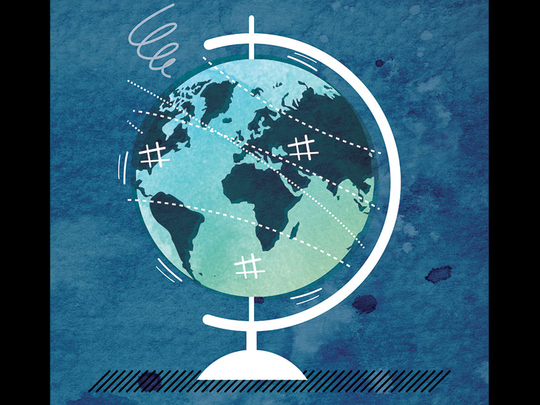
I had penned my column titled: ‘2016 was devastating for order and security’. In that, I had argued: “I was hoping after I made my dire predictions a year ago (2015), my ominous forecasts for 2016 would be wrong. But unfortunately, it did not come to pass. It is hard to make predictions, but this year (2017) could be messier, bleaker and more unforgiving for the Middle East and the world.”
If 2016 was punctuated by “Brexit”, then 2017 was the year of United States President Donald Trump and Trumpism with his unique and bold controversial views on domestic bipartisan issues as well as on international issues that reverberate all over the world, jolting capitals and keeping allies, foes and enemies bewildered, shocked and guessing, if not provoked, and suffer from deliberate uncertainty and unpredictability.
2017 was a tough year, with the Gulf Cooperation Council still grappling with Qatar’s noncompliance towards the demands made by Saudi Arabia, UAE, Egypt and Bahrain, seeking Doha to shun its support for the Muslim Brotherhood and other such disruptive and terrorist outfits and its cozying up to Iran, which has interfered with the internal affairs of countries in the region. This rift has left a lingering doubt about GCC unity and its future, even though it has weathered many crises and upheavals in the past.
Terrorism and terrorist organisations, mainly Daesh (the self-proclaimed Islamic State of Iraq and the Levant), were dealt a major blow. Daesh lost its so-called capitals in Mosul, in Iraq, and Raqqa in Syria, but there was heavy collateral damage in the form of killings of thousands of innocent civilians. To make matters worse, Russia indiscriminately bombed rebel-held areas in Syria that were opposed to Syrian President Bashar Al Assad as Russian President Vladimir Putin prematurely announced the defeat of Daesh in Syria and started partial withdrawal of his troops to score some points before the presidential election in Russia next March!
The Prime Minister of Iraq, Haider Al Abadi, meanwhile, proudly announced — after more than three years of Daesh pronouncing its ‘Caliphate’ — that Iraq had been liberated from Daesh’s clutches! One ought to remember that the danger of Daesh regrouping is still quite potent, though there may not be any major attacks soon.
The continued genocide in Syria is a big stain on the face of the civilised world, which has failed the Syrian people for years. What was distressing in 2017 was the sinking reality that the international community is now resigned to fate that Al Assad could stay on for at least the transition period. And that is shameful.
Any reflection on 2017 will miss the point if the analysis does not factor in the Trump administration’s policies, actions, or the lack of it, statements and tweets. No president in American history has managed in less than a year to unite some many segments of American society against him — women, blacks, immigrants, media (the new opposition), the intelligence community, the leadership of his Republican party and even the National Football League NFL and its players, who knelt to protest discrimination when singing the US national anthem. Trump’s wrath has somehow managed to unite America’s allies and enemies alike against him: Muslims, Mexicans, Latin American countries, Nato members, China, North Korea, Palestinians, Iranians, even Arab Gulf states, who all voted against Trump’s move to recognise occupied Jerusalem as Israel’s capital.
In 2017, we witnessed major shifts, upheavals and mayhem. The Middle East continued to experience its usual instability. Trump, unlike other US presidents, made his maiden overseas trip to the Middle East, starting off with Saudi Arabia, participating in three summits in May 2017, signing deals, talking business and delivering a speech to 50 heads of Muslim states about fighting terrorism. And for the first time, he shied away from repeating his favourite expression, “Islamic radical terrorism”. It is an insulting and racist term that offends Muslims by tying up radical terrorism with Islam. Islam, like all other religions, condemns and rejects killing of innocent people.
By the end of 2017, it is abundantly clear that there is a developing Trump doctrine that is tied to his campaign pledge: The “America First” slogan; protecting the homeland; promoting American prosperity; preserving peace through strength; and advancing American influence.
The US National Security Strategy NSS) was attacked by both Russia and China as unilateralism and imperialism for singling Russia and China as “revisionists and rival powers”. Although Trump in delivering his NSS, he did not mention Russian interference in his favour in the 2016 US presidential elections. According to the US intelligence community’s assessment, the NSS document clearly accused the “Russians of trying to undermine the legitimacy of democracies”.
Richard Hass, the chairman of the prestigious Council on Foreign Relations think tank, has argued that in 2017, the world is in greater disarray than a year ago. Hass said: “If there is a word to describe the Trump foreign policy, it is ‘abdication’ not isolationism.”
I find it appropriate to remind the readers about how I had ended my column a year ago: “Once again, 2016 was a devastating year for order and security! The fear is that 2017 could top 2016 to be even messier, bleaker and unforgiving. Ironically, that could make us look back to that awful 2016 with solace!”
I hate to admit this, but I was once again right about 2017! Let us see what 2018 has in store for us.
Professor Abdullah Al Shayji is a professor of Political Science and the former chairman of the Political Science Department, Kuwait University. Twitter: @docshayji.









